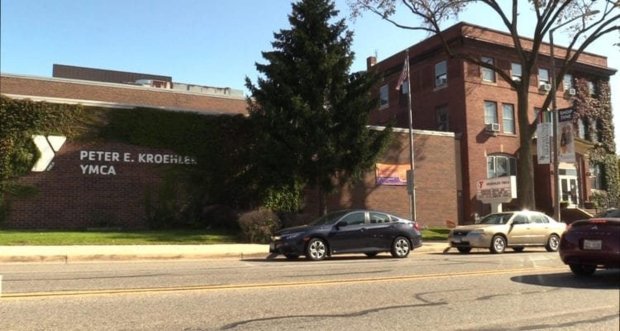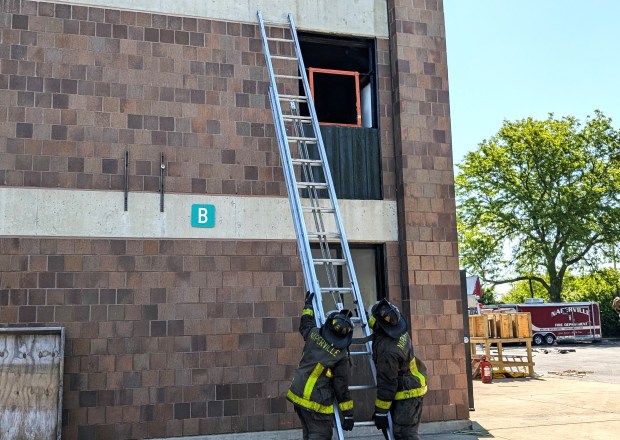Every week we publish a historic photo highlighting a story from Naperville’s past from the history archives of Naper Settlement.
The YMCA played has played a big part in Naperville life dating back to the early 1900s.
While you may be familiar with Fry Family YMCA on 95th Street, it’s only been around since December 1995. The one we’re writing about today came long before it.
The YMCA, an acronym for Young Men’s Christian Association, was founded in London in 1844 by George Williams. He was concerned there were no places in the industrial city for young men to go other than saloons and brothels. His organization’s goal would be to improve the spiritual condition of young men working in the trades by focusing on patriotism, service, masculinity, and the moral and physical values of sports.
The YMCA concept soon spread to America and in February 1909, there was growing interest in having one in Naperville. While some regional Y leaders thought the community too small to support one, a board of trustees was elected in April 1909 and E.J.T. Moyer chosen as its president, a role he would hold for 25 years.
Peter Kroehler, president of what was known as the Naperville Lounge Co., is credited with the idea of holding a membership drive, with a goal of securing 300 members who would each pay $5 fee to join.
It was a huge success. By April 21, 1909, 312 men and boys has signed up. A fund drive launched two months later raised $26,260 in just 15 days.
A charter was granted by the state of Illinois on July 7, 1909, and on Memorial Day 1910, the cornerstone laid for the new building at 34 S. Washington St.
The turnout for the event was huge, with music provided by the Naperville Lounge Co. Factory Band and the Naperville Boys Band. The Rev. L.C. Schmidt gave the invocation, the Rev. W.A. Schutte read from scripture, Judge Orrin N. Carter made an address and the. Rev. Alfred E. Randell gave the benediction,
Moyer was charged with laying the cornerstone, essentially a box that contained a treasure trove of local lore, including:
- A list of building fund contributors;
- A sketch of the building, names of campaign committeemen, boosters and Ladies’ Auxiliaries;
- Names of the board of directors and list of three hundred signatures pledged for membership;
- Copies of the Constitution and the bible;
- Lists of city officials, committees, codes and other documents;
- List of churches, their pastors, trustees, and number of members;
- List of business enterprises of the city;
- List of public schools in Naperville as well as their directors and teachers;
- Copy of North-Western (now North Central) College catalog;
- Copies of the Naperville Clarion newspaper;
- Names of the contractors and architects;
- Record of Walter Blanchard Post No. 386 GAR and a silk flag it donated;
- The YMCA annual.
An additional $15,000 was raised to complete construction of the three-story building, which was dedicated on March 26, 1911.
At the time it opened, Naperville was the smallest community in the YMCA organization with a fully functional facility.
Although initially intended just for men, the board voted on Nov. 13, 1911, that women and girls could use the Y for 90 minutes each week if they paid 75 cents each. Nine years later, in 1920, women and girls were allowed to use it one day a week.
In 1948, $175,000 was raised to make needed updates to the building, and programs were added between 1960 and 1965 as the Y tried to keep pace with Naperville’s population growth, which increased membership.
Ground was broken in 1972 for a $786,000 addition that added a new locker room, racquetball facilities and a large swimming pool. A second addition opened in 1978.
Harkening back to its roots, the YMCA was dedicated in 1989 as the Peter E. Kroehler Program Center after Kenneth and June Kroehler donated $1 million in Peter Kroehler’s memory.
Ground was broken on Sept. 13, 1994, for the Fry Family YMCA at Book Road and 95th Street. It opened in December 1995.
The Kroeher Y would close five years later. The Washington Street building was torn down in in July 2022 to make way for new development.
Andrea Field is the curator of history at Naper Settlement. For more information, go to www.NaperSettlement.org.
Steve Metsch is a freelance reporter for the Naperville Sun.




